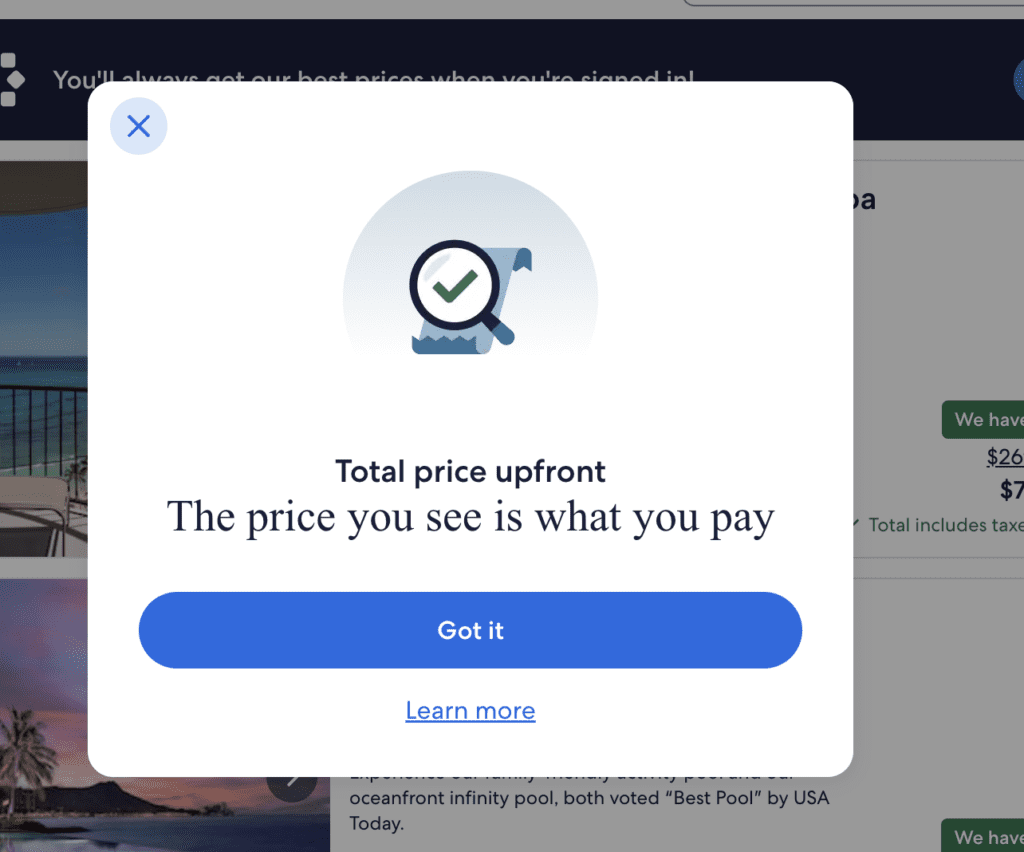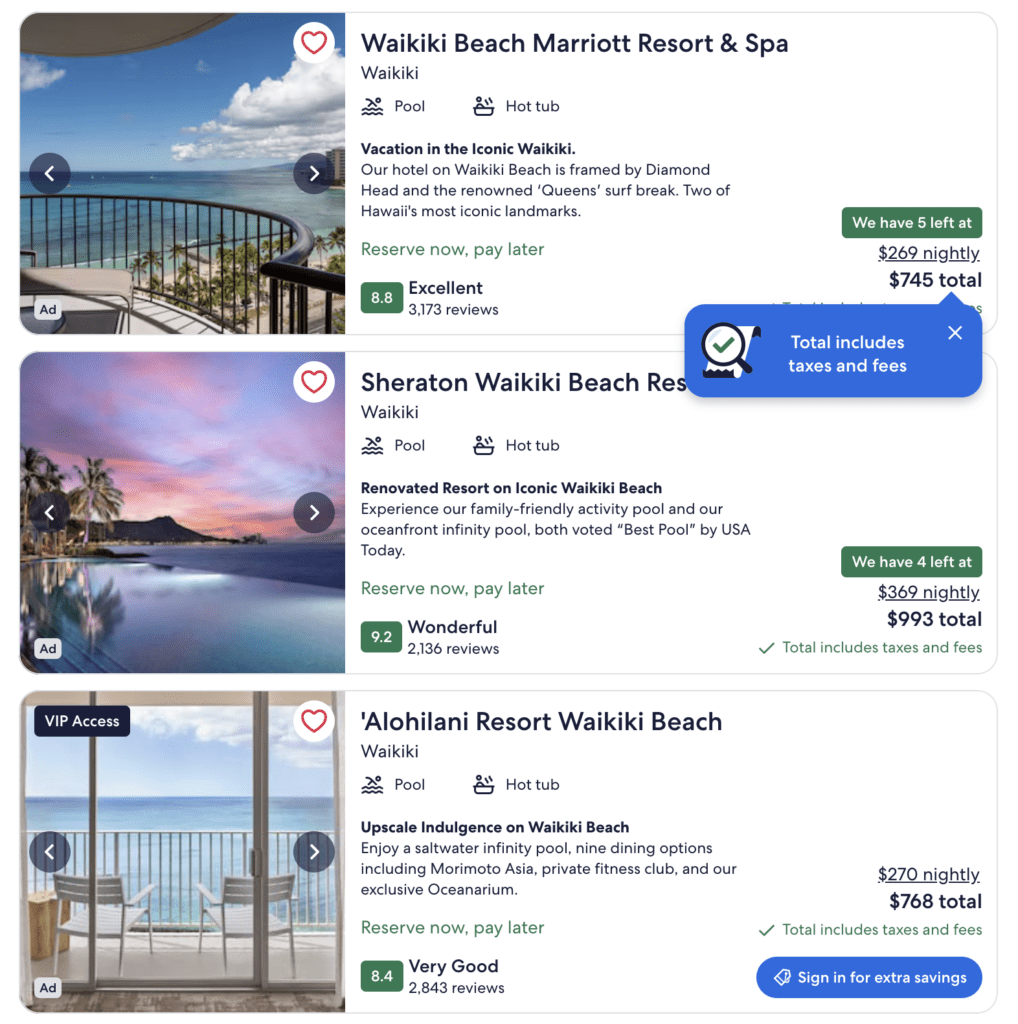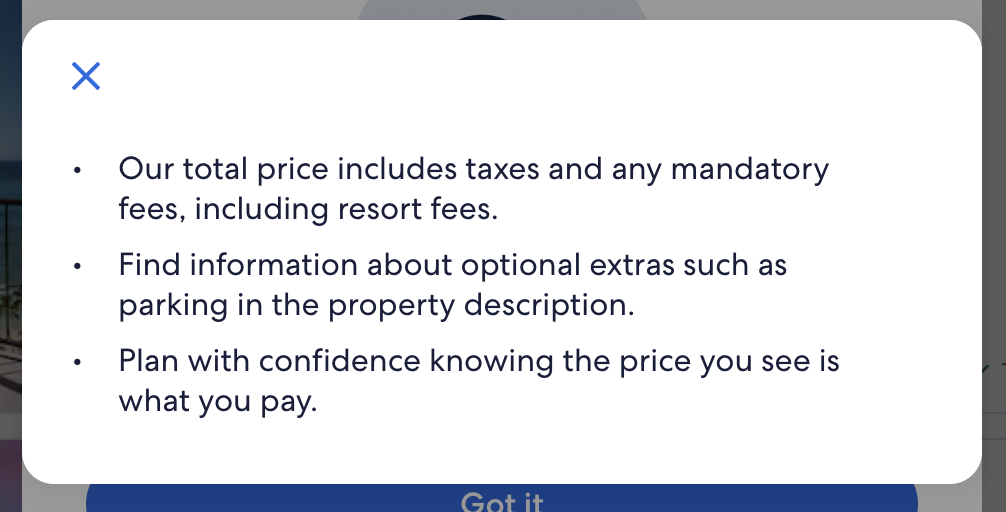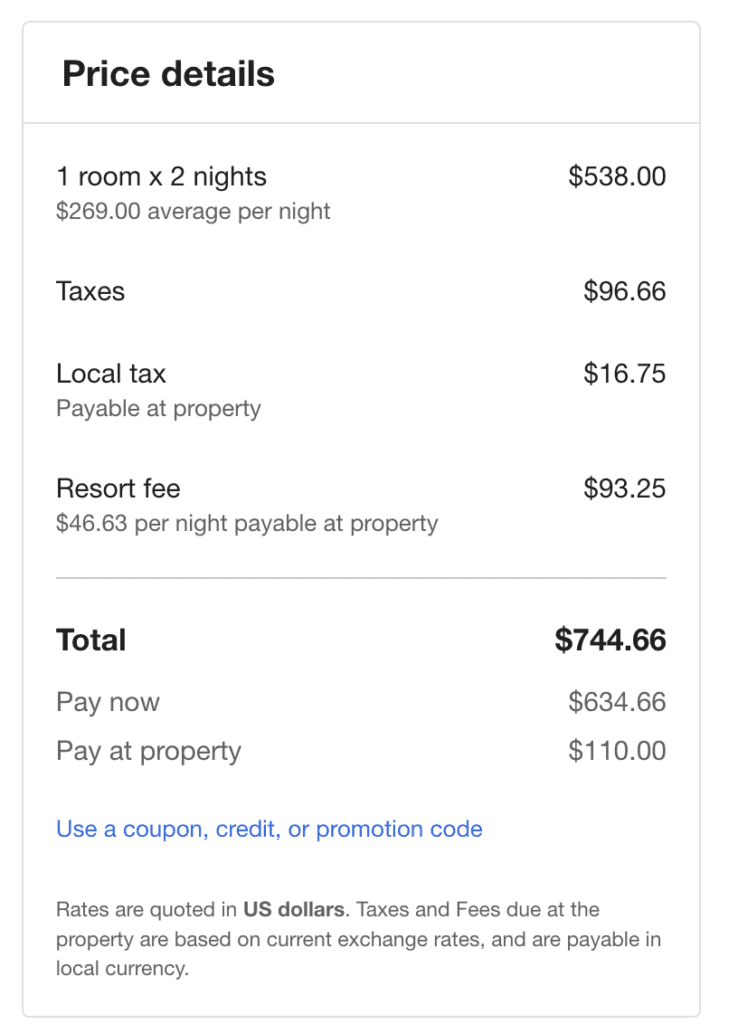Few things kill the vacation mood faster than discovering your hotel bill includes an extra $50 per night in “resort fees” for amenities you never used—or worse, didn’t even know existed. Add in surprise service charges, booking fees, and taxes tucked away until checkout, and the final price can feel more like a punchline than a promise.
It’s no wonder travelers, myself included, have grown weary of the fine print. But starting May 12, 2025, a new rule from the Federal Trade Commission (FTC) aims to change that by requiring businesses to disclose all mandatory fees upfront. No more lowball nightly rates followed by a cascade of extra charges at checkout.
I still have egg on my face from a recent review at the new Renaissance Honolulu Hotel and Spa where I mentioned they had no resort or destination fee in the video. 1 week later, they added one, @#$%!
So if your two-night escape to Waikīkī comes with a hefty resort fee and layered taxes, you’ll see it in the total price before you book—not after you’ve mentally committed to the view.
Progress? Definitely. Transparent? Mostly. Now, if only we could be notified as to the parking charges…
What Is the FTC’s “Junk Fee” Rule
Let’s be clear: the FTC’s Rule on Unfair or Deceptive Fees (often called the junk fee rule), which went into effect on May 12, 2025, doesn’t eliminate “junk” fees—it simply requires businesses to be upfront about them. That means no more discovering extra charges right before checkout or, worse, after you’ve already booked.
The new regulation makes it illegal to advertise a deceptively low price and then tack on mandatory fees later in the process. Instead, the total price—including all non-optional charges—has to be shown from the beginning.
It’s a move aimed at restoring some long-lost honesty to the marketplace.
So why now? For years, consumers have been calling out hidden fees as not just annoying, but downright deceptive. And nowhere is that more relevant than in the travel industry, especially here in Hawai‘i, where beautiful views often come with not-so-beautiful surprises at checkout.
Common fees Hawai‘i travelers are used to seeing (but not always upfront):
Resort fees – often $25–$60+ per night for access to Wi-Fi, beach towels, “free” activities, or daily newspapers
Cleaning fees – standard on vacation rentals, sometimes nearly equal to a night’s stay
Service charges – added to dining bills, spa treatments, or even room service
Facility or amenity fees – for pools, fitness centers, or lounge chairs
Booking fees – especially from third-party travel platforms
Energy surcharges – yes, that’s a thing, and no, it’s not always disclosed clearly
Parking fees – sometimes not revealed until you arrive and see the valet kiosk
These costs add up—quickly. And when they’re hidden until the last minute, it erodes trust and makes budgeting for a trip much harder.
My personal favorite is the Yoga class held every morning at 6 am and limited to the first 15 who sign up.
How Expedia Now Displays Prices After the FTC Junk Fee Rule Took Effect
What Expedia Is Doing Right: Clarity in Total Price
Clear Upfront Messaging: A pop-up overlay confirms that “the price you see is what you pay,” and notes that total price includes taxes and any mandatory fees, including resort fees.

Total Price Displayed Early: In search results, the total cost for a stay (in this case, $745 for two nights at the Waikiki Beach Marriott Resort & Spa) is prominently listed alongside the nightly rate.

Confirmation Across Pages: When selecting a room, repeated notices like “Total includes taxes and fees” reinforce that all required charges are reflected in the total price.

Where Transparency Still Falls Short: Nightly Rate vs. Total Price
Nightly Rate Still Excludes Fees: Although the total is accurate, the highlighted nightly price ($269) does not include taxes or fees. A pop-up clarifies this: “Nightly price excludes taxes and fees.” This could still be misleading to users scanning nightly rates quickly without reviewing the total.
Fee Breakdown Buried in Final Steps: The actual cost breakdown—revealing $93.25 in resort fees and $113.41 in combined taxes—is only visible after clicking “More details” and moving toward checkout. The consumer does not see this breakdown until nearly the end of the booking flow.

While Expedia is largely in compliance with the letter of the new FTC rule, it’s still possible for travelers to feel misled—especially in a market like Hawai‘i where resort fees can exceed $40–$50 per night. The presentation of a low nightly rate next to a much higher total cost may still create sticker shock if consumers don’t pause to read the fine print.
What Charges Can Still Be Excluded from the Initial Price
While the FTC’s new rule is a big step forward for pricing transparency, it’s not a blanket requirement to include every possible charge in the upfront price. The rule specifically targets mandatory fees—in other words, anything you’re required to pay in order to complete your booking.
So what can still be left out of that total you see in the search results or on the first booking page? Quite a bit, actually.
Still fair game for exclusion (for now):
Optional add-ons – Charges for extras you choose, like:
Room service
Spa treatments
On-demand movies
Beach gear rentals
Breakfast packages or wine upgrades
Taxes – These can still be itemized separately, even if included in the total price later in the booking flow. You’re likely to see:
- Hawai‘i state excise tax
- Transient accommodations tax (TAT)
- County-level hotel taxes
- Incidental charges – Anything billed to your room during your stay, like minibar snacks or valet tips
How this plays out in Hawai‘i
At resorts and hotels across the Islands—especially in popular areas like Waikīkī, Wailea, and the Kohala Coast—this distinction matters. Properties with long lists of amenities can now draw a clearer line between what’s included and what’s extra.
For example:
A hotel might have to disclose its $45-per-night resort fee in the total price from the start.
But it doesn’t have to include optional fees like that $120 lomi lomi massage or your mai tai at the pool bar.
For travelers, this means you’ll have a better idea of your base cost before booking—but you’ll still need to budget for any splurges. And since taxes can still appear as a separate line item later in the process, you might not see the fully itemized breakdown until you’re closer to checkout.
What Happens If Businesses Violate the Rule?
The FTC’s new junk fee rule doesn’t just ask nicely for transparency—it comes with real teeth. Businesses that fail to disclose mandatory fees upfront can face serious consequences, especially if they continue to rely on deceptive pricing tactics.
What the FTC can do
Under the rule, the Federal Trade Commission can take enforcement action against businesses that:
Advertise a price without including all required charges
Misrepresent fees as optional when they’re actually mandatory
Hide fees until the final stages of checkout
Use confusing or misleading terms like “resort fee” or “service fee” without proper context
If a business is found in violation, the FTC can:
Impose civil penalties (up to $50,120 per violation)
Seek consumer refunds or restitution
Issue cease-and-desist orders or pursue other legal remedies in federal court
That’s not just limited to hotels—airlines, ticketing platforms, vacation rentals, and tour operators all fall under the rule if they advertise or transact directly with consumers.
What travelers can do
If you feel misled by a price or discover undisclosed mandatory fees after booking, you’re not powerless. Here’s what you can do:
Report the issue to the FTC at reportfraud.ftc.gov
Contact the booking platform or property directly to ask for a fee breakdown or request clarification
Leave a review detailing the fee experience—this helps other travelers spot patterns
Keep documentation (screenshots, emails, booking confirmations) to support any dispute or complaint
More Clarity, Less Shock – My Thoughts
Let’s be honest—we earned this moment.
After years of playing “guess the real price” on hotel booking sites, of clicking on what seemed like a $249 deal only to end up paying $389 after fees, taxes, and a mysterious “urban destination wellness enhancement charge,” it’s a little satisfying to see the FTC finally step in.
So yes, I sincerely hope someone files a claim, gets a refund, and enjoys it on behalf of all of us who silently paid up for that $42 “resort fee” in order to use a plastic lei and a laminated map of local attractions. Maybe they’ll use their payout to finally cover the parking we never saw coming.
Progress? Yes. Accountability? Hopefully. Trust restored? We’ll see. But if nothing else, we now have a rule that says what we should have known all along—the price you see should actually be the price you pay.
And here in Hawai‘i, where visitors come to relax—not decode their invoice—that feels like a small victory worth celebrating. Even if the lomi lomi massage still costs extra.










